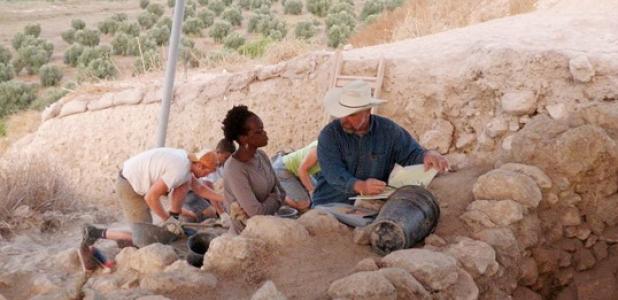COWBOY ARCHAEOLOGIST
Fri, 2015-08-07 05:00
News Staff
By LYNETTE SOWELL
Jerry Jewell, pastor of Living Hope: Church in the Field, never expected that a summer undergraduate course seven years ago to satisfy a degree requirement would turn into a years’ long passion.
“As a child, I use to go with my dad to the old communities on Fort Hood, with a metal detector and an ice pick, but the idea of being involved in archaeology never crossed my mind,” he said. Jewell recently returned from his eighth trip to Israel as a participant in the Tel Gezer project.
“I was working on my undergraduate studies and needed a lab science course. The Gezer expedition is a teaching dig. It’s designed to take people who have either no knowledge of archaeology but an interest, and those who are studying it, to have time in the field.”
Jewell completed his undergraduate degree in December 2008, then began his Master of Divinity with a concentration in archaeology.
The Tel Gezer Project is run by the Tandy Institute for Archaeology at Southwestern Baptist Theological Seminary and a consortium of other schools, in cooperation with the Israeli Antiquities Authority. The project accepts volunteers from around the world and from all faiths to work together on the one dig. “This project began in 2006,” Jewell said. “The purpose is to try to connect the previous archeological digs, one from the 80s called Solomon’s Gate, and another dig back in the 70s that turned out to be a housing area. What the project has been doing is to find out the relationship be-tween the two. In ancient cities, government was conducted inside the gate. It’s not like the gates we have. It’s actually a structure with chambers inside.”
Houses in Tel Gezer were “cookie cutter” fourroom houses and two stories tall, with columns inside to help hold the second story up. Tel Gezer sits on the edge of the foothills west of Jerusalem, overlooking the coastal highway that runs from Egypt all the way up to Syria, and eventually Persia. It’s a major crossroads of the ancient world, and was extremely important, Jewell said.
The ancient city is mentioned in several Egyptian and Assyrian texts, and is mentioned in the biblical account of Solomon’s fortifications and was continuously occupied from the Bronze Age to the Hellenistic Period.
While in Israel, Jewell said he helps teach others how to excavate, but some of his time is spent looking for tools in the country. “I know there’s a Home Depot somewhere in Israel, but I haven’t found it yet,” he quipped.
Jewell described one time when he went to Jerusalem to try to find a sledgehammer handle. He was shopping in the market in the old city of Jerusalem, which he said is like biggest flea market in the world. “It’s an opportunity to get out among the culture. It’s definitely different than Texas.” As far as safety is concerned, Jewell said he feels safer in Israel than he would in the Killeen Mall.
Some of the most unique finds Jewell and the project team have encountered while digging was in a 3,400 year old structure, in which they found a rare Egyptian cylinder seal, used to roll across clay to make imprints. “As we began to excavate further, we found three more, along with a scarab from King Tut’s great grandfather, Amenhotep,” Jewell said. “Now, it says in the Bible, that Pharaoh of Egypt gave King Solomon the city of Gezer as a wedding present.”
In 2008, when Jewell began working at Tel Gezer, the group was excavating at the Hellenistic level, then progressed to the eighth century B.C. “We came upon a house that had been undisturbed for 2,800 years. This house had grinding stones, pottery, storage jars, it even had a potter’s wheel.” Jewell said the Israeli Antiquities Authority helps document and measure where each find is discovered, so that when the group is done with excavation and pick work, they can build a 3-dimensional model of the city according to the location of the items. Jewell said dig teams are usually 80-100. with 30 team members being staff, and the other 50 or so volunteers from all over the world. The majority are college students, others are people interested i archaeology and for whom it’s a summer trip—like a retired air traffic controller from New Zealand who volunteered for the dig, in her 70s
Jewell said while excavating in close quarters, it’s only a matter of time before discussions of faith come up, and he’s had the opportunity to give away Bibles to fellow diggers. During the 2012 excavation, there was an atheist, a Muslim, and a backslidden Baptist, and Jewell, all working in a seven-foot grid together. When talking with the young lady from Pakistan, a Muslim, he asked if she’d ever read the Bible, and she said no.
“I asked if I got her one if she’d read it, and she said yes,” Jewell said. He has even found a place near the dig where he can purchase Bibles, and he tries to keep one on hand to give away, should the opportunity arise. He was at a Catholic monastery nearby, purchasing some olive oil, and saw they had stacks of Bibles, in English, Hebrew, and Arabic. Jewell added that side trips are available on the weekends for a tour of the country, in which a bus and guide will drive dig volunteers from Golan Heights to Negev, to the Dead Sea. This year, Jewell said he served as the chauffeur for the trips.
More information about the Tel Gezer Project can be found at telgezer.com.

